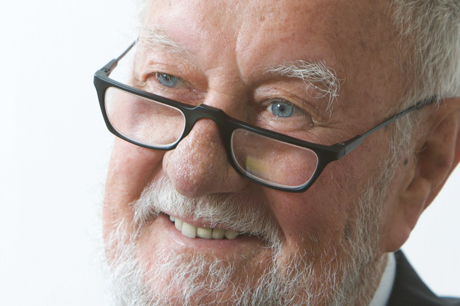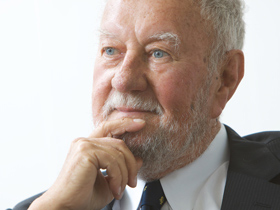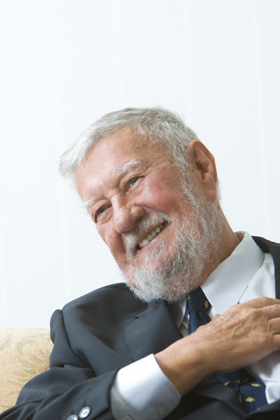

Copyright © 2011 Kanda Gaigo Alumni Association(KGAA). All rights reserved.
50th Anniversary -Interviews-

In 1986, Kanda University of International Studies invited a professor of English education, Francis. C. Johnson from Hawaii University. He was born in Australia and taught in Papua New Guinea, Hawaii and Hong Kong. At that time, Johnson came to KUIS as a replacement of his colleague for two years. However he stayed for 20 years and as a director of the ELI, developed an unique learning program that became the SALC. Why did Johnson decide to stay in Japan? What is the motivation for him to create the SALC?

My grandfather was a sailor and came to Australia in 1890. Our family name Jonson is Jansson in Swedish. He jumped ship in Sydney and decided to stay in Australia in 1890.
I was born in 1934. My father was a public servant in Australia. He worked for the Sydney city council. And my mother stayed at home. We were average working class people. I have one brother and one sister. My brother is 12 years older than me. My sister is 10 years older than me. I was spoiled by both my brother and sister and my parents. They treated me like a doll as a baby.
When I was young, I was only interested in sports. I was a surfer and a swimmer and loved athletics and football. I have represented Australia at swimming. I loved reading and was good at doing exams. So I was able to go to university. I was the only one of my family to finish high school and go to university. I obtained a Commonwealth Scholarship from the government to go to Sydney University.

I studied education because I wanted to be a teacher. I wanted to talk a lot. It was three years of study for the Bachelor of Arts and a further two years for the Diploma of Education. Then I did a Bachelor of Economics degree as well, because I wasn't sure if I would be a good teacher. After graduation, I had to do National Service in the armed forces. So, I did mine in the Australian air force. I got my pilot's license.
After National Service, I went to Papua New Guinea to be an elementary school teacher, because I didn't want to teach in Australia. So I have chosen to teach English in a foreign country. I was 22 years old. In Papua New Guinea, I trained teachers, too.
In Papua New Guinea there are 750 different languages. My first class that I taught in Papua New Guinea consisted of 35 students who spoke 30 different languages. Now, each language reflects the culture of the people who speak the language. Culture is a way of looking of the world. Each of these students had a different way of looking of the world. English is very different from their languages and culture. It was very very difficult. I had to find ways of getting across to them the English way of thinking.
So what I had to do there was to write the textbooks for them to learn English. I became a textbook writer. And my textbooks were published and used throughout Papua New Guinea and the Pacific Islands. I trained teachers with the textbooks which I wrote. At classroom teaching I developed my skills there but I did not know the theory on which they are based. I had to go to study. I wanted to expand my skill of teaching English.
So I decided to be a professional to teach English as a foreign language. I went to London University. I did a Postgraduate diploma in Teaching English as a Second Language. And then, I studied at Columbia University, Teacher's College. In 1963, there was only one university in the world where you could do doctoral studies of language teaching. If you wanted to study language teaching then, you had to study linguistics, not language teaching. I wanted t do language teaching. At Columbia University, I did my MA and Doctor of Education degrees in 1965. The University of Papua New Guinea opened in 1966 and I returned there. I had the first Chair of English Language at that university.
The interesting thing about working in Papua New Guinea was to teach important people. One of my students is now Prime Minister of Papua New Guinea. Many of my students later became important ministers, ambassadors, and so on. In Australia, I would never teach important people.
I can say that my experience in Papua New Guinea determined my later career. Because I wrote textbooks there, I became a textbook writer. At KUIS, I wrote textbooks when I first came. In Papua New Guinea, my class had 30 different languages, so it's there that I might have started to be interested in the development of learner autonomy and individualizing instruction.
After Papua New Guinea, I went to teach at the University of Hawaii, and after that, I had the Chair of English at the Chinese University of Hong Kong.(1/6)
Contact: Kimiyo WATANAE
PR department / Sano Educational Foundation
Telephone: +81-33258-5837
http://www.kandagaigo.ac.jp/
Photographer: Hideki SHIOZAWA
http://www.shiozawahideki.com/